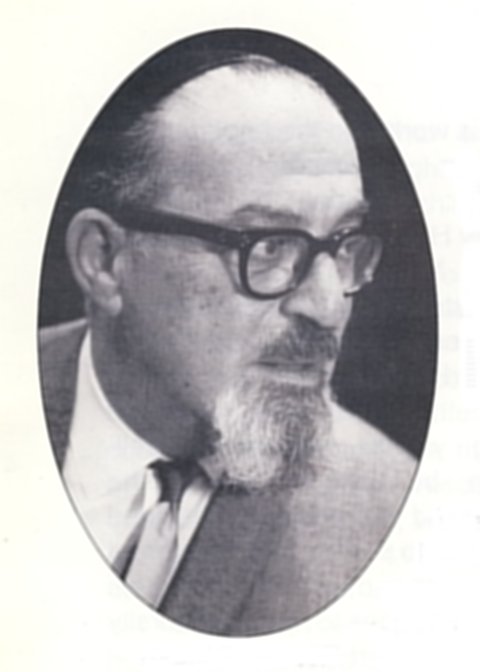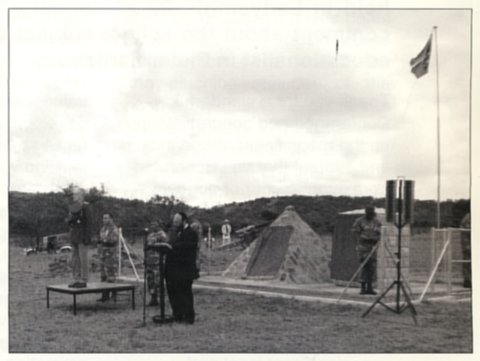

 The South African
The South African

Why would a foreign born Rabbi take on an extensive research project documenting the role played by Jews in the Boer armed forces during the Anglo-Boer War, 1899-1902? Part of the answer as to why Rabbi Dr Louis Rabinowitz did so might be seen in a protest meeting he addressed in Johannesburg in 1946. The occasion was a demonstration by local Jews against Britain's anti-Zionist policies in the Palestinian Mandate territory. In the course of denouncing this, the Rabbi famously cast his Second World War service medals to the ground, declaring that he was no longer proud to wear them. For this, he was praised in the Afrikaans press and correspondingly attacked in the English.
While presumably being a factor, L I Rabinowitz's interest in Jewish Boers went further than mere disappointment with his home country's about-face on the Palestine question. In addition to being a minister of religion, he was a noted Judaic scholar, with a number of important works of Jewish historiographical interest under his belt. Perhaps the main motivating factor was his burning sense of Jewish honour, which inspired him to confront the stereotype of Jews as being timid and weak by showing how they, too, could point with pride to their feats on the battlefield. One sees this time and again in his lectures and writings on the subject.
Rabbi Rabinowitz' interest was initially sparked through his researching and writing up the story of Chaim David (Herman) Judelewitz, the 'Russian Rebel' who joined the Boer forces as a volunteer, rose to the rank of veld-cornet and was eventually killed while heading up a large party of Cape Rebels in the north-west Cape. He concluded his article on Judelewitz by expressing the hope that further research would show him not to have been 'a unique exception, but as an example of the manner in which the Jews did their duty to the country of their adoption'. This he set out to prove himself over the next few years.
During the latter half of the 1940s, Rabbi Rabinowitz pursued his pet project with characteristic zeal and rigour, inter alia consulting the British POW lists and records of Boer enlistees in the State archives and corresponding with both Jewish and non-Jewish veterans of the war, as well as their families. He also, where possible, met with and interviewed Jewish oudstryders (war veterans). As more information came in, he set about compiling an annotated nominal roll of Jewish Boer participants, at all times scrupulously providing references and sources. He also delivered a number of lectures, reports on which appeared in both the Jewish and Afrikaans press, and wrote several monographs, which were published in the journal Jewish Affairs.
In addition to his detailed paper on C D Judelewitz, Rabinowitz produced a number of other important monographs. These comprised an account of the wartime career of Joel Charles Duveen, an article based on his interview with the Oudstryder Jacob Arnold and a history of the Jewish Ambulance Unit, formed by Johannesburg Jews to assist the Boers (and subsequently the wounded on both sides) in the field.
The documentation amassed by the Rabbi was eventually passed on to the archives of the South African Jewish Board of Deputies (SAJBD) in Johannesburg. It was added to the existing files on Jewish participation in the war, which included transcripts of interviews with veterans carried out by the Jewish Sociological and Historical Society. This research began to be conducted in earnest only in the early 1940s, by which time most Jewish Boer veterans had already passed on; had it commenced even half a decade later, virtually none would have remained and their stories would have died with them.
The SAJBD's Anglo-Boer War collection today consists of four pamphlet boxes. They comprise original correspondence with war veterans and their families, transcripts of interviews, numerous cuttings from the Jewish and Afrikaans press, journal articles, nominal rolls, photographs and Rabbi Rabinowitz's working notes. Most of the documentation referred to by the Rabbi in his annotated nominal roll is included although some, including correspondence with General Pienaar (a kommandant in the Anglo-Boer War) is regrettably missing.
While occasionally consulted over the next half century, this valuable repository of primary historical documentation on the war was largely unknown and under-utilised. In 1999, however, when the author was conducting research for a special Anglo-Boer War centenary issue of Jewish Affairs, the meticulous pioneering work done by Rabbi Rabinowitz and others working in the field at last began yielding its considerable fruits. Following the centenary issue (which proved to be gratifyingly popular), a number of further articles of Anglo-Boer War interest were published in Jewish Affairs, with the bulk being written by the author and Professor Richard Mendelsohn of the University of Cape Town. The SAJBD Archives again provided the basis of much of this research. Finally, at the beginning of 2010, the author brought out a book on the Jewish Boers, the first full-length treatment of the subject. Entitled Boerejode: Jews in the Boer Armed Forces, 1899-1902, it was jointly dedicated to Rabbi L I Rabinowitz and to the members of the long defunct Jewish Sociological and Historical Society. The dedication was only fitting. While much additional information had been gathered, the crucial work they had done formed the core of the book.
Rabbi Rabinowitz left South Africa in 1961, settling in Israel. There he went on to do important work for the Encyclopaedia Judaica. He died in 1984.
Boerejode - Jews in the Boer Armed Forces, 1899-1902 is available from the author, David Saks, who can be contacted at david@beyachad.co.za
On 11 December 2009, one hundred and ten years to the day after a British raiding party attacked a Boer gun position on what came to be known as Surprise Hill, just outside Ladysmith, a solemn ceremony took place on the site of the action in remembrance of those on both sides who lost their lives in the encounter. Three monuments were unveiled: the restored memorial to the men of the Rifle Brigade, a plaque in memory of the Boer dead and a separate plaque, in Afrikaans and Hebrew, in remembrance of Harry Spanier, the first Jew to lose his life in active service on the Boer side. The ceremony, which marked the first-ever formal recognition of the Jewish role on the Boer side during the Anglo-Boer War, was attended by the Mayoress of Ladysmith and other dignitaries, as well as civic leaders, heritage workers, family of the deceased and sundry wellwishers. The SA Jewish Board of Deputies partnered with the Ladysmith Siege Museum Trust in helping to organise and publicise the event.
The proceedings commenced with music by the Ezakheni Salvation Army Band and a parade march by a guard of honour from the 5th SA Infantry. Following a scripture reading and prayer from Chaplain Rev Japie Jordaan, Rabbi Silberhaft recited the Hazkara in Hebrew in memory of Spanier, thereafter reading an adapted English rendition in memory of all those who had died in the battle.

Brigadier-General Deon Fourie, the Guest of Honour, delivered the keynote address, eloquently stressing how South Africans coming together to honour the fallen on both sides was representative of the values of reconciliation and cooperation that was so fundamental a feature of South Africa's young democracy.
'In our "beloved country", as elsewhere, there is too much to lose from continuing resentment and so much to gain from putting the past behind us and in making the greatest efforts to advance together in friendship and cooperation,' he said. Fourie further noted that Spanier had been one of between two to three hundred Jews who had served in the Republican commandos, a fair number given the small Jewish population of that time.
The monuments were then formally unveiled and a two-minute silence observed. (In the day's only mishap, the 12-pounder gun intended for the gun salute discharged prematurely just as the MC was calling for this). Next came the laying of various wreaths, with David Simpson, President of the Council for KwaZulu-Natal Jewry, placing Spanier's wreath on behalf of the SAJBD and the SA Jewish Ex-Servicemen's League. A tree was planted by the Niemeyer family in memory of John Charles Niemeyer, one of the four Boers killed in the engagement.
Return to Journal Index OR Society's Home page
South African Military History Society / scribe@samilitaryhistory.org